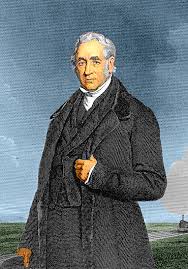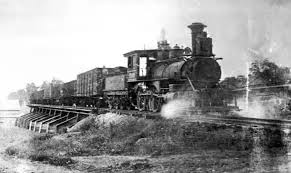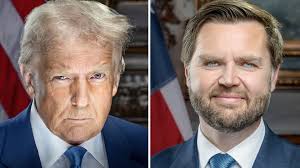THE RAILROADS AND THEIR BEGINNINGS
part two
Catagory: History
Author:Edward Hungerford
Posted Date:01/17/2025
Posted By:utopia online
They turned their attention to roads. But, while roads were comparatively easy to maintain and were possible routes of communication the entire year round, they could not begin to compare with the canals in point of tonnage capacity, because of the limitations of the drawing power of animals. Some visionary souls experimented with sail wagons, but of course with no practical results.
At this time there came distinct rumors from across the sea of a new transportation method in England—the railroad. The English railroads were crude affairs built to handle the products of the collieries in the northeast corner of the country, to bring the coal down to the docks. But there came more rumors—of a young engineer, one Stephenson, who had perfected some sort of a steam wagon that would run on rails—a locomotive he called it,—and there was to be one of these railroads built from Stockton to Darlington to carry passengers and also freight. These reports were of vast interest to the earnest men who were trying to solve this perplexing problem of internal transportation. Some of them, who owned collieries up in the northeastern portion of Pennsylvania and who were concerned with the proposition of getting their product to tidewater, were particularly interested. These gentlemen were called the Delaware & Hudson Company, and they had already accomplished much in building a hundred miles of canal from Honesdale, an interior town, across a mountainous land to Kingston on the navigable Hudson River. But the canal, considered a monumental work in its day, solved only a part of the problem. There still remained the stiff ridge of the Moosic Mountain that no canal work might ever possibly climb.
To the Delaware & Hudson Company, then, the railroad proposition was of absorbing interest, of sufficient interest to warrant it in sending Horatio Allen, one of the canal engineers, all the way to England for investigation and report. Allen was filled with the enthusiasm of[Pg 6] youth. He went prepared to look into a new era in transportation.
In the meantime other railroad projects were also under way in the country, short and crude affairs though they were. As early as 1807 Silas Whitney built a short line on Beacon Hill, Boston, which is accredited as being the first American railroad. It was a simple affair with an inclined plane which was used to handle brick; and it is said that it was preceded twelve years by an even more crude tramway, built for the same purpose. Another early short length of railroad was built by Thomas Leiper at his quarry in Delaware County, Pennsylvania. It has its chief interest from the fact that it was designed by John Thomson, father of J. Edgar Thomson, who became at a much later day president of the Pennsylvania Railroad Company, and who is known as one of the master minds in American transportation progress. Similar records remain of the existence of a short line near Richmond, Va., built to carry supplies to a powder mill, and other lines at Bear Creek Furnace, Pennsylvania, and at Nashua, N. H. But the only one of these roads that seems to have attained a lasting distinction was one built by Gridley Bryant in 1826 to carry granite for the Bunker Hill Monument from the quarries at Quincy, Mass., to the docks four miles distant. This road was built of heavy wooden rails attached in a substantial way to stone sleepers imbedded in the earth. It attained considerable distinction and became of such general interest that a public house was opened alongside its rails to accommodate sightseers from afar who came to see it. This railroad continued in service for more than a quarter of a century.
But the motive power of all these railroads was the horse; and it was patent from the outset that the horse had neither the staying nor the hauling powers to make him a real factor in the railroad situation. So when Horatio Allen returned to New York from England in[Pg 7] January, 1829, with glowing accounts of the success of the English railroads, he found the progressive men of the Delaware & Hudson anxiously awaiting an inspection of the Stourbridge Lion, the first of four locomotives purchased by Allen for importation into the United States. Three of these machines were from the works of Foster, Rastrick & Co., of Stourbridge; the fourth was the creation of Stephenson’s master hand. The Lion arrived in May of that year, and after having been set up on blocks and fired for the benefit of a group of scientific men in New York it was shipped by river and canal to Honesdale.
Allen placed the Stourbridge Lion—which resembled a giant grasshopper with its mass of exterior valves, and joints—on the crude wooden track of the railroad, which extended over the mountain to Carbondale, seventeen miles distant. A few days later—the ninth of August, to be exact—he ran the Lion, the first turning of an engine wheel upon American soil. Details of that scene have come easily down to to-day. The track was built of heavy hemlock stringers on which bars of iron, two and a quarter inches wide and one-half an inch thick were spiked. The engine weighed seven tons, instead of three tons, as had been expected. It so happened that the rails had become slightly warped just above the terminal of the railroad, where the track crossed the Lackawaxen Creek on a bending trestle. Allen had been warned against this trestle and his only response was to call for passengers upon the initial ride. No one accepted. There was a precious Pennsylvania regard shown for the safety of one’s neck. So, after running the engine up and down the coal dock for a few minutes, Allen waved good-bye to the crowd, opened his throttle wide open and dashed away from the village around the abrupt curve and over the trembling trestle at a rate of ten miles an hour. The crowd which had expected to see the engine derailed, broke into resounding[Pg 8] cheers. The initial trial of a locomotive in the United States had served to prove its worth.
The career of the Stourbridge Lion was short lived. It hauled coal cars for a little time at Honesdale; but it was too big an engine for so slight a railroad, and it was soon dismantled. Its boiler continued to serve the Delaware & Hudson Company for many years at its shops on the hillside above Carbondale. The fate of the three other imported English locomotives remains a mystery. They were brought to New York and stored, eventually to find their way to the scrap heap in some unknown fashion.
Mr. Allen held no short-lived career. His experiments with the locomotive ranked him as a railroad engineer of the highest class, and before the year 1829 closed he was made chief engineer of what was at first known as the Charleston & Hamburg Railroad, and afterwards as the South Carolina Railroad. This was an ambitious project, designed to connect the old Carolina seaport with the Savannah River, one hundred and thirty-six miles distant. It achieved its greatest fame as the railroad which first operated a locomotive of American manufacture.
This engine, called the Best Friend of Charleston, was built at the West Point Foundry in New York City and was shipped to Charleston in the Fall of 1830. It was a crude affair, and on its trial trip, on November 2, of that year, it sprung a wheel out of shape and became derailed. Still it was a beginning; and after the wheels had been put in good shape it entered into regular service, which was more than the Stourbridge Lion had ever done. It could haul four or five cars with forty or fifty passengers at a speed of from fifteen to twenty-five miles an hour, so the Charleston & Hamburg became the first of our steam railroads with a regular passenger service. A little later, a bigger and better engine, also of[Pg 9] American manufacture and called the West Point, was sent down from New York.
Word of these early railroad experiments travelled across the country as if by some magic predecessor of the telegraph. Other railroad projects found themselves under way. Another colliery railroad, a marvellous thing of planes and gravity descents, was built at Mauch Chunk in the Lehigh Valley, and this stout old road is in use to-day as a passenger-carrier.
But it was already seen that the future of the railroad was not to be limited to quarries or collieries. Up in New England the railroad fever had taken hold with force; and in 1831, construction was begun on the Boston & Lowell Railroad. This line was analogous to the Manchester & Liverpool, which proved itself from the beginning a tremendous money-earner. Boston, a seaport of sixty thousand inhabitants was to be linked with Lowell, then possessing but six thousand inhabitants. Still, even in those days, Lowell had developed to a point that saw fifteen thousand tons of freight and thirty-seven thousand passengers handled between the two cities over the Middlesex Canal in 1829.
Then there developed the first of a new sort of antagonism that the railroad was to face. The owners of the canals were keen-sighted enough to discover a dangerous new antagonist in the railroads. They protested to the Legislature that their charter gave them a monopoly of the carrying privileges between Boston and Lowell, and for two years they were able to strangle the ambitions of the proposed railroad. This fight was a type of other battles that were to follow between the canals and the railroads. The various lines that reached across New York State from Albany to Buffalo, paralleling the Erie Canal, were once prohibited from carrying freight, for fear that the canal’s supremacy as a carrier might be disturbed. The Baltimore & Ohio Railroad, struggling to[Pg 10] blaze a path toward the West, was for a long time halted by the Chesapeake & Ohio Canal, which proposed to hold to its monopoly of the valley of the Potomac.
The Boston & Lowell, however, conquered its obstacles and was finally opened to traffic, June 26, 1835. Within a few months similar lines reaching from Boston to Worcester on the west, and Providence on the south had also been opened. By 1839 Boston & Worcester had been extended through to Springfield on the Connecticut River, where it connected with the Western Railroad, extending over the Berkshires to Greenbush, opposite Albany. The Providence Road was rapidly extended through to Stonington, Connecticut. From that point fast steamboats were operated through to New York, and a quick line of communication was established between Boston and New York. Before that time the fastest route between these two cities had been by steamboat to Norwich, then by coach over the post-road up to Boston. Norwich saw the railroad take away its supremacy in the through traffic. Finally it awoke to its necessity, and arranged to build a railroad to reach the existing line at Providence.


.jpg)














 👁 :160
👁 :160
 👁 :249
👁 :249
 👁 :1
👁 :1
 👁 :
👁 :
 👁 :312
👁 :312
 👁 :361
👁 :361